Oh my Gawd, I LOVE this effect .
I’m referring to the upper right corner that folds back.
As Kel sometimes says, I WANT IT! I NEED IT!
Oh my Gawd, I LOVE this effect .
I’m referring to the upper right corner that folds back.
As Kel sometimes says, I WANT IT! I NEED IT!
It rained hard all weekend in the Pacific Northwest, and yesteday started out exactly the same. I came back soaked from my morning walk with Skye.
Right after lunch, though, despite the forecast, the skies cleared and the sun shone brightly. Inspired, I grabbed camera and headed straight for the beach.
I was greeted by my old friend the Kingfisher sitting on the railing at the Pt. Defiance Boathouse. Last time I tried to take pictures of him it was so dark that I had to use an ISO of 800 and 1600 and the pictures turned out grainy. Today it was so bright that even at ISO 100 sections of the white on his chest were burned out. Still, I considered the fact that he was there at all rather auspicious since I haven’t seen him for quite awhile:
As it turned out, it was a great day for birding. I saw a number of birds I’ve never seen before, and even more that I have seen before but never tire of, such as this Red-Necked Grebe feeding on a crustacean:
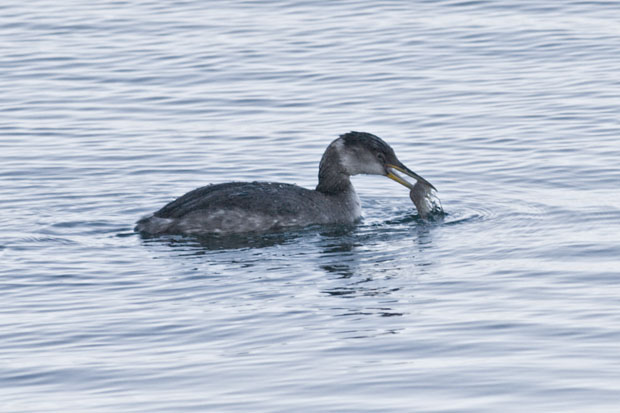
But most of the time at the beach was spent stalking a male Red-Breasted Merganser, a bird I first noted last week while identifying a female Red-Breasted Merganser, as opposed to the more common Common Merganser, though I’ve never personally seen a male Common Merganser, and the less common Hooded Mergansers, which I have seen.
The first time I spotted him out at quite a distance I thought it looked like a bird I hadn’t seen before, but I couldn’t be sure until I’d downloaded the pictures and saw them at screen size. I spent nearly a half hour waiting for him to move closer, but he never did. Finally I spotted this female Red-Breasted Merganser swimming nearby:
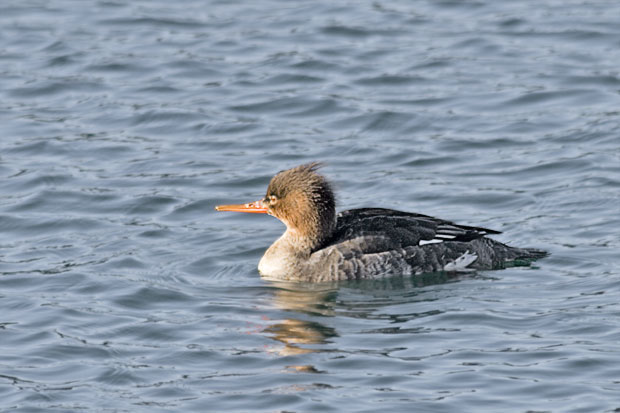
Knowing a little about male nature, I figured if I stayed close to the females that the lone male would soon show up, and sure enough he did, looking quite dapper:
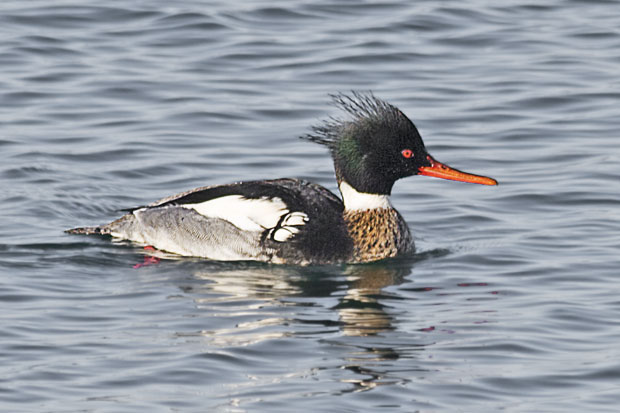
Nothing quite like a day spent with old friends and a new acquaintance to start the week.
Despite reading several critics that argue otherwise, I can’t help but feel that Larkin’s is too pessimistic, but many of his poems still resonate deeply , perhaps a reminder we all share darker moments in life.
I originally thought my favorite poems from 1964-1974 were the “love,�? or, more precisely, the anti-love poems like “Talking in Bed�? that challenged stereotypes of love and marriage.
Then I turned a page and discovered:
GOING, GOING
I thought it would last my time —
The sense that, beyond the town,
There would always be fields and farms,
Where the village louts could climb
Such trees as were not cut down:
I knew there’d be false alarms
In the papers about old streets
And split-level shopping, but some
Have always been left so far;
And when the old part retreats
As the bleak high-risers come
We can always escape in the car.
Things are tougher than we are, just
As earth will always respond
However we mess it about;
Chuck filth in the sea, if you must:
The tides will be clean beyond.
— But what do I feel now? Doubt?
Or age, simply? The crowd
Is young in the M1 café;
Their kids are screaming for more—
More houses, more parking allowed,
More caravan sites, more pay.
On the Business Page, a score
Of spectacled grins approve
Some takeover bid that entails
Five per cent profit (and ten
Per cent more in the estuaries): move
Your works to the unspoilt dales
(Grey area grants)! And when
You try to get near the sea
In summer …
It seems, just now,
To be happening so very fast;
Despite all the land left free
For the first time I feel somehow
That it isn’t going to last,
That before I snuff it, the whole
Boiling will be bricked in
Except for the tourist parts —
First slum of Europe: a role
It won’t be so hard to win,
With a cast of crooks and tarts.
And that will be England gone,
The shadows, the meadows, the lanes
The guildhalls, the carved choirs.
There’ll be books; it will linger on
In galleries; but all that remains
For us will be concrete and tyres.
Most things are never meant.
This won’t be, most likely: but greeds
And garbage are too thick-strewn
To be swept up now, or invent
Excuses that make them all needs
I just think it will happen, soon.
and thought, “Damn, wish I had written this poem.�? It expresses my own views so clearly I could almost imagine I had written it, without the rhyme, of course, because I could never say what I wanted to say in rhyme. Perhaps that’s what it makes it better than my own rantings on this subject.
The subject of the poem is an old one, of course, a Romantic complaint about man’s destruction of the natural world, brought up to date. The narrator is no Romantic, indeed he’s a realist who always seems to have assumed that “progress�? would in the end have little effect on the environment, because it has never threatened the existence of the natural world in the past, despite the protests of poets. All the years that mankind has diverted sewage to the seas, the seas have absorbed it and continued to thrive. This is the same assumption most people still seem to operate under, worrying little, if at all, about the environment.
Larkin describes recent trends to move out of the city and to the country to escape all that’s wrong with big cities, generally bringing all the sprawl that’s part of the problem with them. And since it’s primarily the richest people who are escaping to the wilderness and the seashore, they have to build huge houses. Even those who consider themselves environmentalists and build “green�? houses, destroy the wilderness by the very act of building there.
And when they find themselves threatened by “cougars�? or “bears�? whose homes they’ve invaded, the raise a great outcry officials are forced to trap or kill these predators.
Despite my attempts to change the way we mistreat the environment, at moment I find myself worrying that Larkin is right, that “greeds/ And garbage are too thick-strewn/ To be swept up now.�? People need so many things, or at least think they do, that they are willing to destroy the very things that they claim to love to live to the fullest here and now.
Mothers drive huge gas-guzzling cars, rationalizing that they are protecting their kids, all the time polluting the air their children breathe and wasting precious oil their children will need if their future is to be assured. People seem to assume that the science that has brought them all these wonderful things will somehow magically resolve problems as they arise. I do not share that faith.
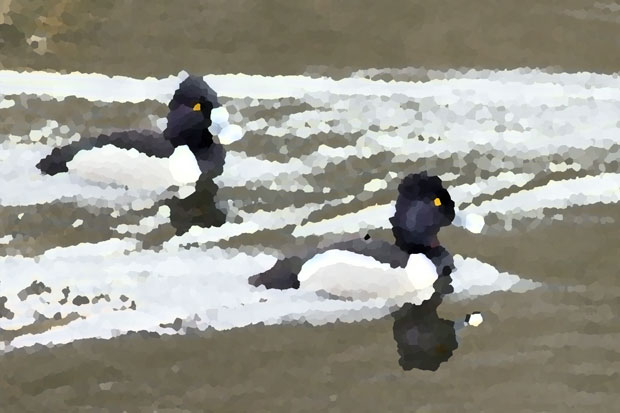
It’s hard to believe that less than six months ago when I heard the word “duck�? I automatically thought of a barnyard duck, the one every child knows goes “wack, wack,�? or the mallard duck, even vaguely thinking that mallard, not drake, was the proper name for a male duck.
I somehow managed to not see most of the ducks that populate our world. When I thought of ducks I thought of those beggars at the local park that came rushing up hoping that your guilt over destroying their environment will cause you to offer them some small crumb of attention.
I should have known better, and on a conscious level I’m sure I did, because an old friend collects various duck decoys and has them all over his house. So much for being a fully conscious, outdoors type. Perhaps I would have been more aware if I were a hunter and knew that my tag only applied to a particular duck, for there’s nothing like the possibility of a fine to create awareness.
Even now, I’m guilty of assuming that I’ve seen something when I haven’t, though I like to believe I’m becoming more aware. The other day I told someone that the black-and-white ducks in a nearby pond were a Barrow’s Goldeneye,
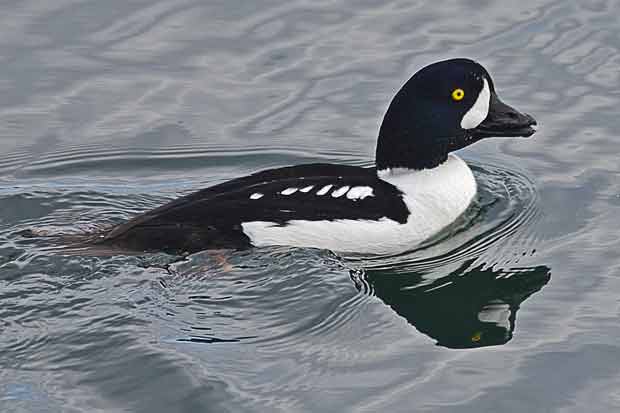
but they weren’t. In fact, once I got my pictures home I realized that they were really a duck I’d never seen before, a Ring-Necked Duck, recognizable by the ring around the beak.
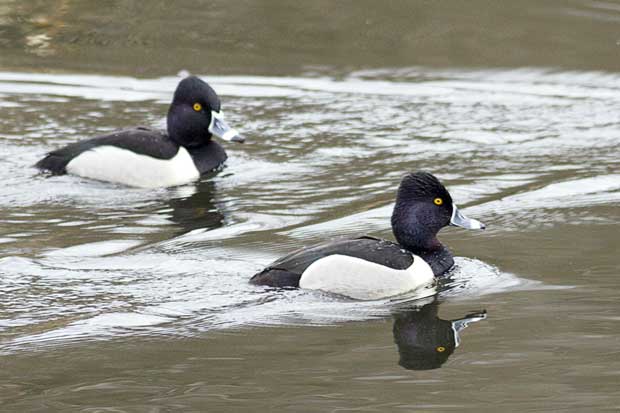
Although I can now easily distinguish between black and white ducks like the Bufflehead and Surf Scoter I showed a few days ago, faced with an unknown duck too often my mind tries to fit into categories that I already know rather than realizing it is a separate species.
That’s the problem with black and white thinking, isn’t it? We unconsciously classify new experiences in terms of past experiences, whether they fit or not, and, in doing so, miss much of the true joy of life, joy that can only come with true awareness.